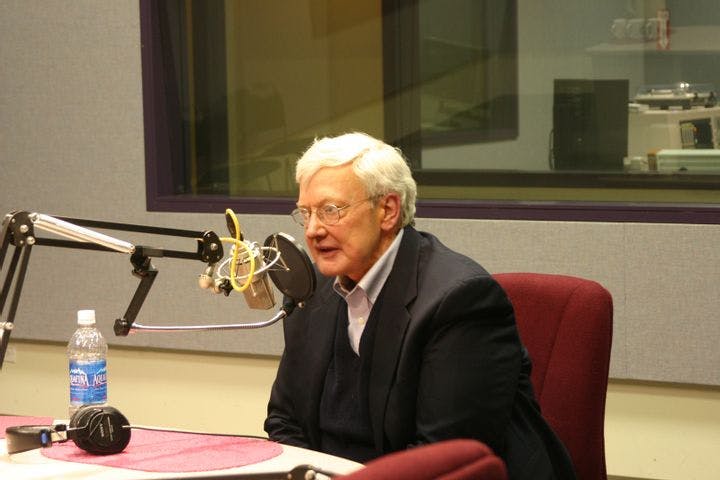Fall 2011
The Natural
– Aaron Mesh
I loved the movies, and I loved Roger Ebert.
I loved the movies, I loved Roger Ebert. As a teenager, I spent hours lying on my bed, engrossed in a fat purple volume of his Home Movie Companion, with its summaries of “grownup” films I had never dared to see: Leaving Las Vegas, Flirting, Natural Born Killers. Later, I would understand how much more grownup Ebert’s reviews were than many of the movies themselves, but at the time, I just knew he was genuine. His informal prose, often suggesting a chat between intimate friends, radiated a nearly aching romance with cinema. He retold other people’s stories, and sometimes I recognized my own.
My reading was a solitary pleasure, though hardly a unique one. Just about everybody loves Roger Ebert. Instantly recognizable from his long-running television shows Sneak Previews and At the Movies, he didn’t so much teach us to take movies seriously—at a time when critics such as Pauline Kael were enshrining films as high art—as make criticism seem like a universal pastime. His naysayers, who are not without their ammunition, charge that he never became much of a student of cinema, and deride his plainspoken, democratic style as artless. But for more than 40 years, he has celebrated the joy of moviegoing and given his readers confidence in their ability to read a film intelligently without being snooty about it.
Since 2006, when thyroid cancer and complications of surgery deprived him of his jaw, his ability to eat and drink, and his speech—his communication is now limited to the written word and the thumb that for years warred with that of the late Gene Siskel on television—Ebert has been granted the chance, like his boyhood hero Huckleberry Finn, to sit in the back of the church for his own eulogies. Even as the tributes pile up, Ebert, now 69, keeps expanding his following. Pundits wondered if there could be an Ebert in the Internet age; it turned out that that new-media critic was—Ebert. His Web site, rogerebert.com, attracts more than 100 million visitors a year. Ebert is one of the few movie critics working today who is comfortable engaging his readers as equals in online comment threads. With this new audience, he has also broached a new subject: himself.
From the personal blog posts that mingle with his reflections on movies have emerged Life Itself, a discursive, companionable memoir that foremost confirms what fans have long known: Ebert is a natural born writer. But the book also makes clear how little we have known of a person who seems to have lived so much of his life in public. For all the years wags spent ridiculing the once rotund Ebert’s fondness for food, we never knew that his real, dangerous weakness was booze. The book’s most compelling essays are sober considerations of alcohol. Ebert celebrates a rollicking Chicago journalists’ dive called O’Rourke’s, then makes an impassioned case for the honest self-appraisal offered by Alcoholics Anonymous. (Of the barroom he remarks, “We knew who we said we were, who we wanted to appear to be, and who O’Rourke’s thought we were, and that was knowing each other well enough.”) He also celebrates his history of interracial romances—his wife, Chaz, is African- American, and he once tried, unsuccessfully, to date Oprah Winfrey.
Though Ebert never cites it explicitly, the book that Life Itself most closely mirrors is A Child of the Century, the 1954 autobiography of the fluent Hollywood screenwriter Ben Hecht, a former reporter who wrote His Girl Friday. Like Hecht, Ebert spends more time chronicling Windy City newsroom capers and childhood idylls than he does contemplating the pictures he liked or didn’t. And the two men, each a writer working at the edges of a temporal art, give special place to the enduring quandaries: God and girls. For Ebert, these two are inextricably linked: His mother wanted him to be a priest, and he resisted, keeping “as much of my life as possible a secret from her” as she slipped into angry alcoholism. He remains anguished about the relationships he let slip away, sheltered in movie theaters watching other lives.
It is perhaps with these losses in mind that he offers his ultimate philosophy. “To make others less happy is a crime,” he writes. “To make ourselves unhappy is where all crime starts.” This book will bring others happiness, because the author so deeply feels pleasure and so honestly acknowledges its obstacles.
* * *
Aaron Mesh is a movie critic and reporter for Willamette Week, an alternative weekly newspaper in Portland, Oregon.
Reviewed: Life Itself: A Memoir by Roger Ebert, Grand Central, 2012, 435 pp.
Photo courtesy of Flickr/Sound Opinions
